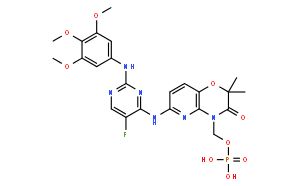
 COA COA |
 MSDS MSDS |
 HPLC HPLC |
 NMR NMR |
| CAS No: | 901119-35-5 |
| Molecular formula(MF) | C23H26FN6O9P |
| Molecular Weight(MW): | 580.46 |
| Alias |
| In vitro | DMSO | 116 mg/mL (199.84 mM) |
|---|---|---|
| Water | <1 mg/mL | |
| Ethanol | <1 mg/mL | |
| In vivo | 4% DMSO+30% PEG 300+ddH2O | 5mg/mL |
| Description | Fostamatinib (R788), a prodrug of the active metabolite R406, is a Syk inhibitor with IC50 of 41 nM, strongly inhibits Syk but not Lyn, 5-fold less potent to Flt3. Phase 3. | ||||||||
|---|---|---|---|---|---|---|---|---|---|
| Features | Converted into its active metabolite R406 in vivo. | ||||||||
| Targets |
|
||||||||
| In vitro |
R788 is a prodrug of the spleen tyrosine kinase (Syk) inhibitor R406. R788 is a competitive inhibitor for ATP binding with a Ki of 30 nM. R788 dose-dependently inhibits anti-IgE-mediated CHMC degranulation with an EC50 of 56 nM. R788 also inhibits the anti-IgE-induced production and release of LTC4 and cytokines and chemokines, including TNFα, IL-8, and GM-CSF. Inhibition of Syk by R788 results in inhibition of all phosphorylation events downstream of Syk signaling. Next to FcϵRI signaling in CHMC, R788 most potently inhibits the signaling of IL-4 and IL-2 receptors. R788 specifically inhibits FcγR signaling in human mast cells, macrophages, and neutrophils. R788 can inhibit local inflammatory injury mediated by immune complexes. [1] R788 induces apoptosis of the majority of examined DLBCL cell lines. In R788-sensitive DLBCL cell lines, R788 specifically inhibits both tonic- and ligand-induced BCR signaling (autophosphorylation of SYK525/526 and SYK-dependent phosphorylation of the B-cell linker protein [BLNK]). [2] |
||||||||
| In vivo | Oral administration of R788 to mice reduces immune complex-mediated inflammation in a reverse-passive Arthus reaction and two antibody-induced arthritis models. [1] In another study, R788 effectively inhibits BCR signaling in vivo, resulting in reduced proliferation and survival of the malignant B cells and significantly prolongs survival of the treated animals. [3] R788 demonstrates a significant reduction in major inflammatory mediators such as TNFalpha, IL-1, IL-6 and IL-18, leading to reduced inflammation and bone degradation in models of rheumatoid arthritis. [4] |